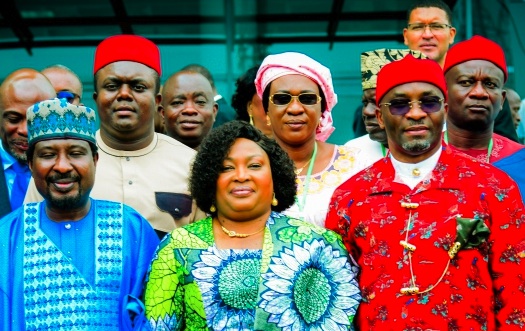
Q1: Mahmood, could you share your journey and experience as a Digital Marketing professional, highlighting key milestones that have shaped your expertise in this dynamic field?
Answer: After university, I had the privilege of working with a Nigerian tech startup during the e-commerce boom. Witnessing the creation and engineering of platforms that attracted and retained customers sparked a deep fascination in me. I wanted to understand the “why” behind consumer decision-making, particularly around purchases. This curiosity led me to explore the power of marketing for tech-driven businesses.
A key milestone shaping my expertise was during the COVID-19 lockdown. Businesses needed to adapt rapidly, and I had the opportunity to work with an FMCG brand solely reliant on physical point-of-sale. We conceptualised the largest Nigerian web platform in their industry vertical. Leveraging our audience’s understanding, digital media consumption insights, and the knowledge that audiences craved “how-to” videos or DIY content, we devised a creative strategy. This involved influencer marketing aligned with media consumption habits and video-led platforms.
One of the most gratifying aspects of this experience was the tangible impact it had on the business’s bottom line. Through our concerted efforts, we successfully transformed a previously negligible revenue stream into a significant contributor, culminating in a remarkable 50% increase in revenue compared to pre-pandemic figures. This achievement served as a testament to the efficacy of integrating consumer behaviour insights with technological innovation to drive sustained growth, even in the face of formidable challenges. It reinforced my unwavering commitment to leveraging my expertise to empower businesses to thrive and prosper in an ever-evolving digital landscape.
Q2: Given Nigeria’s growth as a hub for technological innovation in the region, how do you perceive the role of digital marketing in supporting the growth and development of the Nigerian tech landscape?
Answer: Digital marketing plays a pivotal role in supporting the growth and development of the Nigerian tech landscape. One of the primary ways in which digital marketing supports the Nigerian tech ecosystem is by enhancing the visibility and awareness of innovative tech products and services. Through targeted advertising, content marketing, and social media engagement, marketers can effectively communicate the value proposition of their offerings to diverse audiences across Nigeria’s vast and diverse market segments. Additionally, digital marketing enables businesses to gather valuable insights and feedback from Nigerian consumers, informing product development decisions and optimising go-to-market strategies. By leveraging analytics tools and engagement metrics, businesses can gain a deeper understanding of consumer preferences, behaviours, and pain points, allowing them to tailor their marketing efforts and product offerings to better meet the needs of Nigerian users. This iterative feedback loop not only enhances the relevance and effectiveness of tech solutions but also fosters a culture of user-centric innovation within the Nigerian tech ecosystem.
Q3: How do digital platforms contribute to driving performance for tech brands specifically in the Nigerian market, and what unique opportunities do they offer in this context?
Answer: One of the key advantages of digital platforms in the Nigerian market is their ability to overcome traditional barriers to entry and scale, such as limited physical infrastructure and geographical constraints. With the widespread adoption of mobile devices and internet connectivity across the country, digital platforms offer tech brands a cost-effective and efficient means of reaching a large and diverse audience, regardless of their location or socioeconomic status. In addition, digital platforms enable tech brands to foster meaningful and interactive relationships with Nigerian consumers through personalised content, social engagement, and customer support channels. By creating authentic and culturally relevant experiences that resonate with local audiences, brands can build trust, loyalty, and advocacy among Nigerian consumers, driving long-term performance and sustainability in the market.
Q4: Can you elaborate on the impact AI has had on revolutionising marketing strategies, particularly for tech brands and start-ups?
Answer: AI has completely changed how businesses in general do marketing. It helps create personalised content for customers on a big scale by analysing lots of data. This means they can speak directly to what each customer wants, boosting sales. Also, it makes creating content like images and videos easier and faster, saving time and money for other important stuff. With AI, marketing campaigns can be adjusted quickly based on how well they’re doing. It’s like having a smart helper that keeps track of everything and suggests changes to make things better. This is super important for tech brands and start-ups because they need to stay ahead in a fast-moving market. When used right, this technology builds trust with customers and makes brands more successful. In a nutshell, AI is a game-changer for marketing and Nigerian startups with limited resources are benefiting from it. It personalises content, saves time and money, and helps brands stay competitive. It’s like having a smart assistant that makes marketing easier and more effective. And when it’s used well, it builds trust between brands and customers, leading to more success.
Q5: What are your personal business goals for the rest of 2024 and how do you hope to achieve them?
Answer: I’m keen to learn more in 2024, so that as a professional, I can lead my teams from the front to become more focused on presenting business development and growth strategies to our clients and in the process, start the journey that will ensure we become strategic partners and emerge stronger through the very challenging years we now face.













